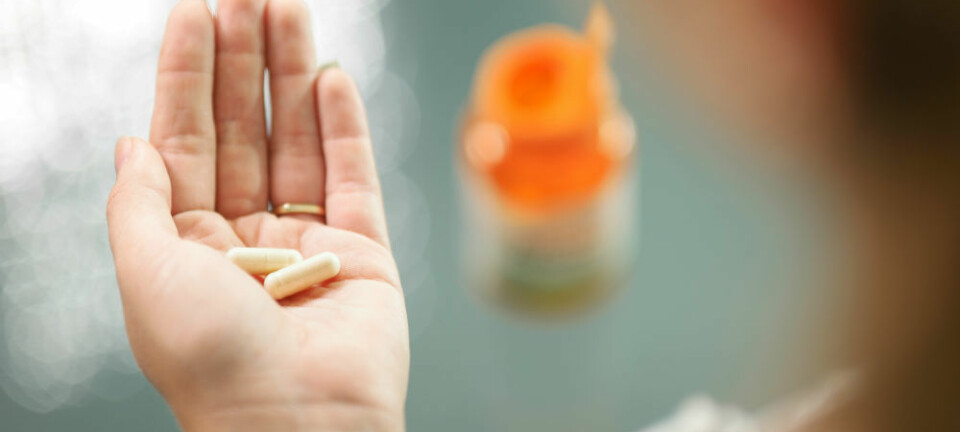
Mums with low iodine intake risk kids with behavioural problems
However, researchers are uncertain whether an iodine deficiency leads to a delay in brain development.
Our bodies need iodine to synthesise vital hormones. One of the problems a lack of this basic element can lead to is thyroid problems, such as goitre.
Many Norwegians are not getting enough iodine.
When a pregnant woman gets much below the recommended daily doses there could be consequences for foetal brain development. A large Norwegian cohort study indicates this risk.
Researchers have used information from the Norwegian Mother and Child Cohort Study.
Some 48,000 pregnant women participated in the study and filled out questionnaires about their eating habits during their pregnancy, and later about how their children were behaving.
The researchers found that mothers with severe iodine deficiencies during their pregnancies were more likely to have three-year-olds with behavioural problems, poorer language skills and fine motor skills.
Aggressive and unfocussed
Behavioural problems in this context include that the child is anxious or depressed, has trouble maintaining attention or is aggressive. Some of the questions asked here are the same as the ones used to diagnose ADHD.
The researchers say a three-year-old with a normal language development should be able to speak in fairly complete sentences. The chances are slightly slimmer that this is the case if the mother did not get enough iodine during the pregnancy.
Fine motor skills are also poorer amongst these children. But there is no link between suboptimal intake of iodine and gross motor skills, or how early the child learns to walk.
No cause and effect
The researchers made allowances for a number of external factors which could impact development, such as parents’ education levels and income, body mass index, dual-languages, energy intake and how much folate the mothers were getting.
The connection between insufficient iodine doses and delayed development was seen even after these components were factored in.
They reckoned that iodine deficiency only explains 16 percent of the differences in behavioural problems and five percent of the delays in language skills.
The fact that researchers find this association does not mean that insufficient iodine doses with certitude impair brain development.
“The effect in each individual child can be small, but as such a large share of Norwegian women who are pregnant have suboptimal iodine intakes, the results are cause for concern,” writes the Norwegian Institute of Public Health on its web pages.
Food is a source of iodine
There are no sure-fire ways of measuring iodine levels in humans, so the researchers had to ask people what they consume of food and supplements and estimate their iodine intakes.
In this study the researchers wished to calculate how much iodine the women were getting through their food.
So they initially looked for women who had not been taking vitamin supplements. About two thirds fell into that category.
On the basis of this self-reported dietary information the researchers calculated that 74 percent were probably not getting sufficient iodine doses from their meals.
One of the researchers was connected with the Norwegian dairy giant, Tine, which of course has an interest in increased consumption of dairy products. Cows are given feed that is fortified with iodine, making milk and dairy products a source of the element.
Fish is the food that is richest in iodine, an element in a group called halogens. Some brands of table salt also have iodine added, but in Norway this only provides a fraction of the recommended daily doses.
Bread, meat, eggs, fruit and vegetables are other sources of iodine, the Norwegian Institute of Public Health points out.
Supplements during pregnancy
Whereas the World Health Organization (WHO) recommends daily intakes of 250 micrograms of iodine, the Norwegian Institute of Public Health advises pregnant women to get doses of 175 micrograms per day. Six out of ten women in the Norwegian Mother and Child Cohort Study had intakes which fell below this level.
The researchers put their recommended minimum daily dose at 160 micrograms. Women who get less run a higher risk of having children with problems. Those with an intake under 100 micrograms per day over longer periods are especially vulnerable.
WHO advises pregnant women to take iodine supplements.
One in three of the women in the study took such supplements during their pregnancies.
But it was seen that such supplements were of no help if the women had general low daily intakes prior to conception. The researchers think there could be a delayed reaction in the body. Starting with supplements after a pregnancy starts could be too late.
It appears that long-term iodine intake initiatives are called for.
The Norwegian Directorate of Health says women in their fertile years should take supplements that provide 100 micrograms per day if they eat little or no fish, milk or yoghurt. The directorate writes that for women with mild or moderate iodine deficiencies, amassing a good iodine supply prior to pregnancy seems to be more beneficial than waiting with supplements until after conception.
-------------------------------------
Read the Norwegian version of this article at forskning.no
Translated by: Glenn Ostling
































